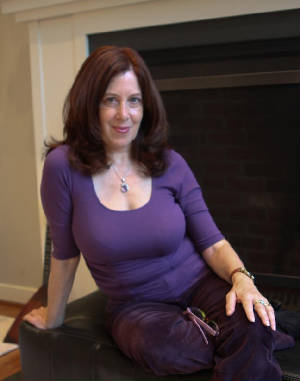
|
| That's me, Pattie Weiss Levy. |
A Modern-Day "Ima" on a Modern-Day Bimah
(With
new content posted every WEEK!)

|
|
Wednesday, January 26, 2011
A
Word From the Weiss
It may seem a bit early in late January to be talking about Purim. To you, anyway. To me, it’s an ever-present, endlessly
viable topic of conversation, always in season. Purim edges out Passover as the Jewish holiday I love best. Purim is my livelihood.
Purim is my life!
Well, maybe those are strong words. Not love, or life. Livelihood. In the 10 years that I’ve been writing
the lyrics for my temple’s annual shpiel, I’ve never earned a penny from Purim. One year, they gave me a nice
bracelet. Another, something truly priceless: the Volunteer of the Year award. No matter that Purim is pretty much the sum
total of my volunteering and temple participation. (Aside from the shpiel and its numerous rehearsals – and the High
Holy Days, of course -- I rarely, if ever, show my face in shul.)
So, what is it that draws me
so habitually to this spring holiday – the chance to eat hamantaschen, the costumes and frivolity (Purim, after all,
is the Jewish Halloween), or the recounting of Esther’s having courageously vanquished that villainous henchman, Haman?
None of the above.
Part of it is just that I relish the chance to write lyrics that people will actually sing and listen to, as opposed
to the usual mundane fare of my life – answering emails, antagonizing my husband, and blabbering on this blog. But beyond
that, there’s something specific about the Purim story, which, as ancient as it may be, still speaks to us today and,
I'm convinced, always will.
Heightening its personal appeal is the distinctly feminist nature of the story. Esther is still hailed as a heroine
for all time, inspiring young girls, along with the rest of us, to boldly face grave danger and risk all for the greater good.
Equally compelling to me, though, is her regal predecessor, Vashti, who refused to dance while publicly baring all
at the behest of her boorish husband, King Ahasuerus. For her role, I have my own personal interpretation, as illustrated
in the lyrics I write.
My take is that she struts out in a huff because she values her self-respect above the riches of royal life and all
else. In my updated idioms, she rushes off to Reno or finds the next flight on Orbitz. The need to preserve her dignity must
prevail at all costs.
I realize that this is not exactly the way the story traditionally goes. In fact, once, when my son was exasperated
with me (for some reason that I no longer recall, at some other time of year), he blurted out the one thing that he knew was
sure to provoke me: “You know, what, Mom? Queen Vashti doesn’t divorce the king. She gets beheaded.”
“She does not!” I countered, instantly incensed at both this suggestion and how effortlessly he could press
my buttons. “You’re so wrong. That’s just your opinion.”
“Opinion?”
he replied, derisively. “No. That’s what it says in the Megillah.”
After whatever
our spat was had blown over, I made him take it back, of course. And apologize. That may sound a little lunatic to you, but
it makes perfect sense to me.
Having grown up with a domineering father who publicly and privately
humiliated my mother relentlessly, on almost a daily basis, I would far prefer to see it my way.
No,
it’s beyond that. Not to get maudlin, but let me be frank. I’m someone whose father often beat the Bejeezus (excuse
the expression) out of her mother, verbally and sometimes otherwise. And still my mother stayed with him. For nearly 30 years.
So the story of a woman (a queen, no less) who storms out rather than submitting to indignity and her husband’s whims?
Now that’s what I call heroic. Somehow, it never grows old.
To my delight, our congregation’s
senior rabbi, Stephen Fuchs, has always gone along readily with this program. After all, as he concurs, it sends an invaluable
message to young girls, women, and men, too, really, about the need to stand up for self-worth. Maybe Queen Vashti and the
guillotine do get mentioned in the same breath somewhere in the Megillah, but honestly, tell me. Where’s the great lesson
in that?
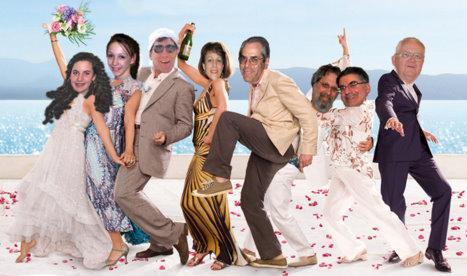
Between that issue and my passion for Broadway musicals -- and the
fun of getting to collaborate with my talented friend Pat, who usually directs -- I never grow tired of this rousing tale
or the chance to retell it to the tunes of some popular, lively show (like, Mamma Mia!, seen above, which we called
"Haman, See Ya!"). The year that we did “Bye Bye Haman” (to the music of Bye Bye Birdie), Vashti
reprised one of Ann-Margret’s memorable numbers, crooning, “I’ve Got a Lot of Leavin’ to Do!”
In my “Est Side Story,” she used the inimitable torch song “Tonight” to voice her determination to
“Take Flight.” Then there was last year’s “South Pers-cific,” in which a shower-cap-clad Queen
Vashti valiantly vowed “I’m Gonna Wash That King Right Outta my Hair!”
This year,
in “The Bubbeh Challah Story,” she will stand up for her rights once again, to the rockin’ strains of “Johnny
B. Goode,” with new words that begin as follows:
Way down in Shushan, Persia, in what’s now Iran
I
am the woman married to the land’s top man
For
decades now, I have sat upon the throne
The
royal palace is the place that I call home.
And
when I hit the dance floor, I look so cool
That
people often mix me up with Paula Abdul.
Hey,
go! Go, Vashti, go! Go! Go, Vashti, go ! Go!
Go,
Vashti, go! Go! Go, Vashti, go! Go!
Set yourself free!
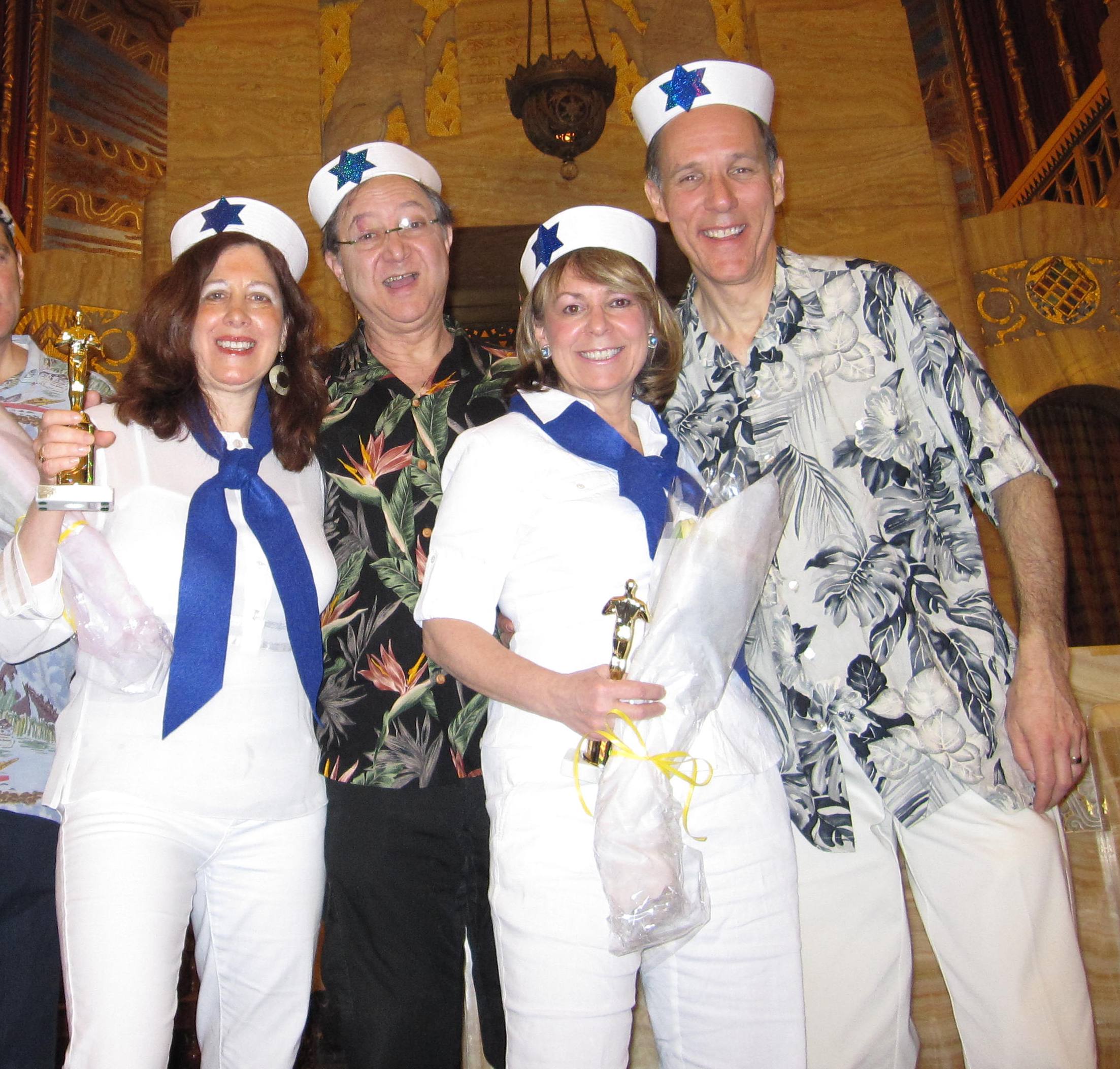 And believe me, there’s plenty more where that comes from. The only disappointing thing about Purim
to me is that I write nine or 10 songs each year, and we rehearse them religiously for months, and then after one performance
-- although we always manage to draw a full house of 500 or more to watch – it’s over. Just like that. And believe me, there’s plenty more where that comes from. The only disappointing thing about Purim
to me is that I write nine or 10 songs each year, and we rehearse them religiously for months, and then after one performance
-- although we always manage to draw a full house of 500 or more to watch – it’s over. Just like that.
People keep advising me to market my lyrics to other synagogues. Maybe I should. As Rabbi Fuchs keeps telling me, he
is relentlessly approached by other lyricists hawking their own scripts, but relentlessly and firmly declines. As
he wrote in rejecting one recent candidate (and believe me, I blush to reproduce his rabbinical stamp of approval
here), "Fortunately, here at Beth Israel we are blessed with the incomparable Pattie Weiss Levy, who writes what
I am sure are the best Purim adapted song lyrics in the entire world."
I'm not sure if four out of five rabbis would agree. But here’s my big marketing pitch:
If your
congregation needs something new to perform this Purim, let me know. Have I got a shpiel for you! Seriously. Just call me
the Purim Queen.
Then again, maybe you should call me something else.
There was some discussion this year that I should
consider playing Queen Esther. As hard as it may be to believe, no one else had stepped forward to claim this incomparable
honor. We’d simply run out of willing teenagers. (And I use the term “teenager” loosely, since invariably
the girls who vie for this privilege are no more than 12. Mysteriously, they grow disenchanted with the prospect of portraying
a commoner who grows up to be queen – a Biblical version of Kate Middleton – within milliseconds after the bat
mitzvah. Do they wake up and start studying for the SATs the very next day? Find Facebook? Discover boys? Do they receive
so many Tiffany bracelets and Coach pocketbooks as gifts that the word “princess” is no longer a fantasy? Or is
there something about having a Torah portion and Haftarah that make young Jewesses grow haughty and jaded overnight?)
Never mind how truly skeevy it is when the king (typically played by a man in his 50s, or even 70s) sings about his
budding passion to a pre-pubescent middle-schooler.
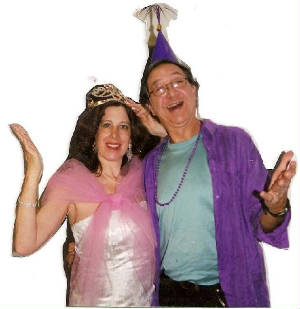 Given my far less tender age, you’d think my Esther days were way behind me. Yes, I played her once, about a
decade ago. But even that was pushing the envelope. I’m now far better suited to impersonate the older and wiser (make
that wise-ass) first queen, Vashti, she of the sharp tongue, hot temper and defiant, “I Won’t Dance” demeanor.
Given my far less tender age, you’d think my Esther days were way behind me. Yes, I played her once, about a
decade ago. But even that was pushing the envelope. I’m now far better suited to impersonate the older and wiser (make
that wise-ass) first queen, Vashti, she of the sharp tongue, hot temper and defiant, “I Won’t Dance” demeanor.
We already have a woman in our congregation far more suited to the job, however. Never mind that she has been playing
Queen Vashti since the Clinton Administration. Or that she graciously offers every year to abdicate to me. She sings much
better than I ever will. To me, she is Vashti, the very embodiment of the role, and she always will be.
Besides,
the paramount pleasure for me in writing these productions is that the people who star in them are not professional actors,
or even true wannabes. They’re just normal folks, fellow congregants who get to headline in a show once a year in front
of their family and friends. Who, least of all me, would ever wanna deprive them of that?
We had no
Esther in sight this year, though, and without her the shpiel can’t go on. So earlier this month, a week before holding
auditions for “The Bubbeh Challah Story” (based on the wildly popular BUDDY: The Buddy Holly Story),
I consented to our temple’s Cantor to play that key role… if, and only if, no one more suitable could be found.
Of course,
on some level, I was secretly thrilled to be considered. Who wouldn't be? But every time I envisioned myself in
front of the congregation, parading around like a teenager, I feared that I'd just make a fool out of myself. Fancying
myself the hot young queen, winner of the beauty pageant and the lascivious king’s heart, didn’t help shave off
a few decades or extra pounds. It made me feel decrepit and old.
Face it, I just turned 56. I am decrepit and old.
Yet as far as I knew, we had no
other viable options. None. So I spent that whole week psyching myself up to do it. (It may not be readily apparent from
my writing, but I’m rather shy.) Meanwhile, I practiced. I mean, I practiced, practiced, practiced. If I had to do it,
I wasn’t going to walk in unprepared. My daughter, Allegra, was still home on winter break from her music college. And being
21, and an aspiring professional singer, she admitted that I was pretty dreadful, and my go-go dancer moves looked ridiculous.
Then she came
up with all sorts of much better, hipper, hotter moves, elaborate choreography that I could almost do and that we giddily
rehearsed together.
We practiced this routine over and over, every day. It was like a sacred mission. When I drove her back to Boston the
night before the auditions, she made me do it with her one more time, just to make sure I had it down cold, before I
kissed her goodbye.
So it was more than a slight disappointment to wake
up the next morning and receive the following email from the Cantor, ecstatically expressed in bold typeface:
I AM SOOOOOOO EXCITED - I HAVE
THE PERFECT ESTHER!!!!!!! TEENAGER - FABULOUS VOICE - GREAT STAGE PRESENCE!!! LEAD IN HER SCHOOL MUSICALS!!!!!
A subsequent message identified this girl was one of her bat mitzvah students. What a relief,
I thought. Replaced before I could even try. By another 12-year-old.
I forwarded these messages to Allegra. The
phone rang instantly. She was beyond distressed. "Promise me you'll sing it anyway!" she cried. I explained
that there was no point, but she wouldn't back down. "I worked hard on that choreography," she protested. “Promise
me you’ll do it!” She said that she would be offended if I didn't at least audition.
So I agreed. Sometimes it's just too exhausting
to keep arguing, especially over something that's incredibly unimportant, yet seems so important
to someone else.
To be perfectly honest, I'd rehearsed it so often that I was eager to sing it anyway. Just that
once. The Cantor had said that the bat mitzvah girl was coming an hour late. There’d be plenty of time to do it before
she appeared, to prove to myself that I could.
When I mentioned my intentions to the Cantor just before everyone else arrived, though, she was not at all pleased.
Clearly. I had asked her to find someone else if possible, she reminded me. Evidently, she had already promised the role
to this girl and was assuming that I wished to compete for the part. How could I ask for it now?
Flustered, I tried to explain that I simply didn’t want to disappoint my daughter, who
had spent so long helping me prepare. But this obviously made no sense to her. So I just sat quietly and watched everyone
else perform. When the girl arrived, having only been approached that morning about the role, she didn’t attempt to
sing the Esther song. Instead, she belted out “All of Me” á capella, showing surprising poise, aplomb and
volume for an eighth-grader. (Word has it that she’s already 13. But not jaded yet. The shpiel is scheduled for March
20, a week after her bat mitzvah.)
Meanwhile,
I sat by, aging inwardly by the minute and thinking how delusional I’d been. I imagined people pointing at me and thinking,
“You? The old hag with the wrinkles? Good thing that we’re doing ‘The Bubbeh Challah Story.’ You’re
just perfect… to play the bubbeh!”
I
also realized that I hadn’t bothered to think out how uncomfortable it might have been if I’d sung it and then
we’d explained to everyone that the girl already had the part.
That
night, my husband and I went to dinner at the home of our good friends Sally Wister and Dial Parrott, who aren’t Jewish,
but, as friends and avid Broadway musical buffs, take a keen interest in hearing about my shpiels. After dessert, I treated
them to an á capella rendition of my Esther song, with my daughter’s hipper (and seductively hip-swaying) moves.
They howled and insisted on hearing the whole score. They didn’t have to ask twice. I have no doubt I was the hippest,
hottest, and, yes, youngest Esther they’d ever seen.
A few days later, the Cantor posted the cast list online, and I was mortified to see that she’d given me second
billing… as a backup singer to Queen Esther. She even had supplied my part with an invented name: Tamar. Two fellow
chorus girls were dubbed Dina and Shulamit. After all these years, I still may not be a Purim scholar, but I’m not aware
of any Tamar being mentioned in the Megillah. Ditto Dina. And there’s sure as sh-t no Shulamit. Plus, if they did exist, they’d decidedly take a back seat to the king, Vashti, Esther, Mordechai, and even the evil
Haman. Not be plastered on the marquee. Plus, if they did exist, they’d decidedly take a back seat to the king, Vashti, Esther, Mordechai, and even the evil
Haman. Not be plastered on the marquee.
From this, I surmised that the Cantor wasn’t annoyed with me at all. Or if she had been, she was trying to make
amends, bending over backwards not to disappoint me.(Never mind that my husband had failed in his valiant attempt to land the Haman role. He too was relegated to singing
backup to the tyrant, listed as one of Haman’s “Hams.”)
So I emailed her trying to explain the whole thing, and to assure her that I never would have put her in
the awkward position of going back on her word to a 13-year-old. Also, that I didn’t require a trumped-up name to assuage my ego. And, although my husband
had written to her demanding similar billing himself, I'd decreed that his character couldn’t have a made-up name, either.
Kosher or not, he was just a Ham.
Sorry to subject all of you to this
whole Megillah. Because the truth is that I’m over it. I’m looking forward eagerly to another Purim and happy
to still have my dignity intact.
I may not be destined to play Esther, a woman who changed history, ever again. But that’s fine with me. When
it comes to history, I’d rather be a woman who gets to rewrite it.
12:34 am
Wednesday, January 19, 2011
A Word From the Weiss
I hesitate to mention it, but last Friday was my birthday, the day of the year that I dread the most, but somehow always end
up enjoying anyway -- despite myself, my misgivings and all the angst that getting older entails. Invariably, the agony of
inching up in calendar years is offset by the ecstasy of hearing the phone ring all day, as friends and relatives from near
and far remember to wish me well, reminding me that no matter how decrepit and decidedly less sexy I may feel, there are plenty
of people who remain my friends, remember my number, and actually continue to care.
So, how old am I? (I know you’re wondering,
but are too tactful or timid to ask.) Being female and far from in the first bloom of youth, I’d rather not get too
specific. Suffice it to say that while drifting off to sleep the night before the big day, I was struck by an alarming thought.
The alarming part was that it hadn’t occurred to me sooner – like any time during the previous 12 months. What
I realized was that I’d been born in 1955 and until last Friday I had been 55. Perhaps, in some mystical, numerological
way, it had been my Golden Year. A year in which all good things (or at least more than the usual piddling few) had been possible.
But I’d foolishly failed to recognize this. Until then, past midnight, when this fabulous confluence of double fives
was definitively over.
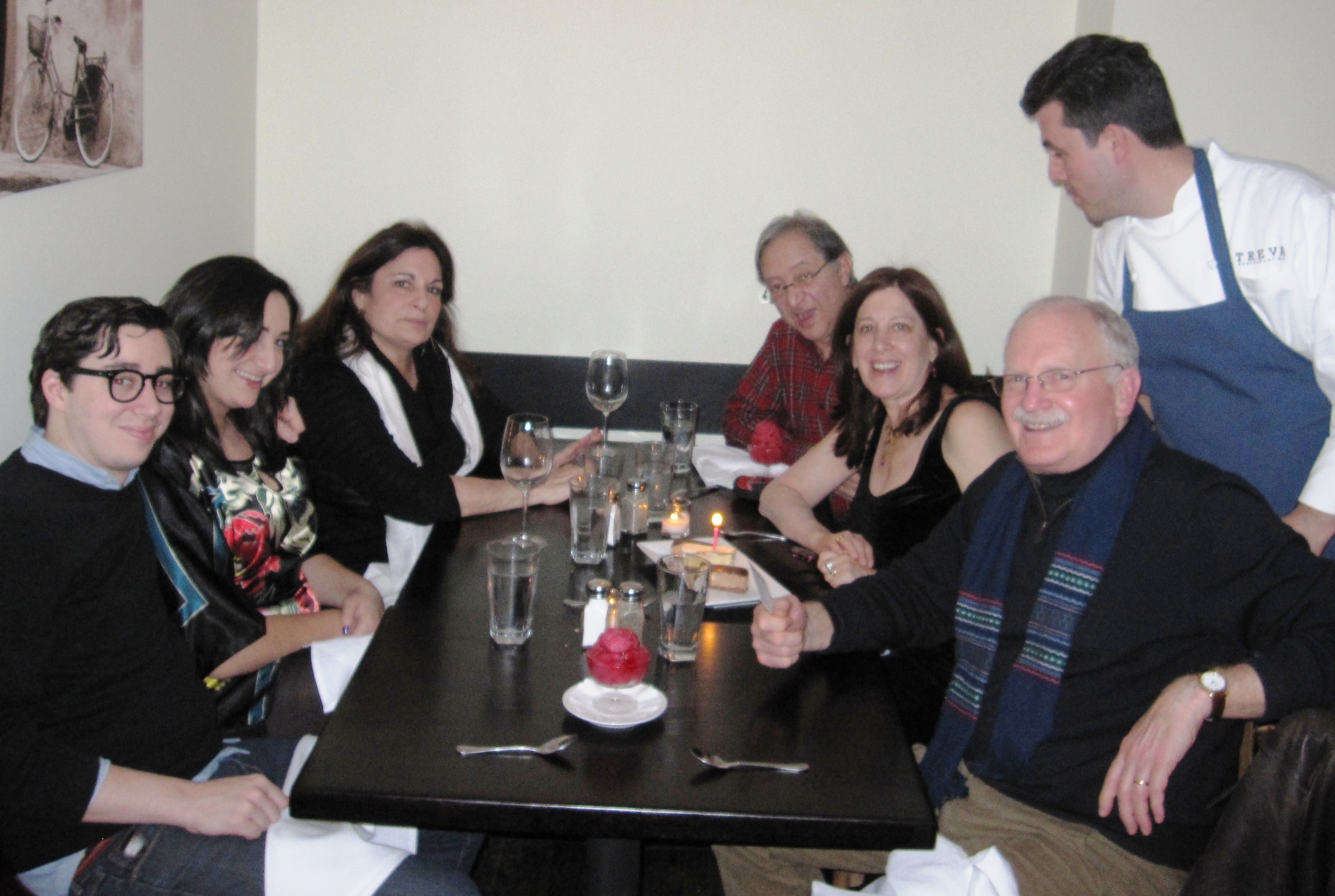
I didn’t get to dwell on my dwindling potential or lost chances, though, for I soon drifted off to sleep, until
the sound of the phone awakened me. Then it kept ringing steadily. Between calls, texts, cards, and emails – as well
as my first-ever Facebook page (created late that night by my daughter and her boyfriend, above far left, as a birthday
surprise) – I heard from people as close as my own living room and as far away as South Africa and St. Croix, including
my husband, brother, son, and daughter, two cousins, and friends Lisa, Liz, Jake, Doreen, Pat, Michael, Rafi, Lois, Suzy,
Richard, Paul, Kathy, Bobbie, Amy, Arlene, Laurel, Yoni, Richard and Russ. (Sorry to go on and on, but that’s the list,
lest you think I’m exaggerating.) I was so busy fielding these greetings that I totally forgot to be miserable and almost
failed to attend to an essential piece of birthday business.
 My license to wear Spandex may not have been scheduled to expire promptly
at midnight, you see, but my driver’s license was. By the time this realization crossed my mind, though, it was already
dark. I raced to AAA, to which I belong, and arrived audibly panting and visibly flustered, with only moments to spare before
it closed at 5:30 p.m. A pale young man whose last task of the day would be to snap my photo smiled, then endeavored
to make me do the same. But first he addressed a few necessary details. My license to wear Spandex may not have been scheduled to expire promptly
at midnight, you see, but my driver’s license was. By the time this realization crossed my mind, though, it was already
dark. I raced to AAA, to which I belong, and arrived audibly panting and visibly flustered, with only moments to spare before
it closed at 5:30 p.m. A pale young man whose last task of the day would be to snap my photo smiled, then endeavored
to make me do the same. But first he addressed a few necessary details.
“Are you still 5-foot-6?” he inquired
as his gaze took my full measure as a woman. I’m not really a hair over 5-5 ½, maybe even less if you account
for possible shrinkage, but my state’s DMV refuses to recognize half-inches, so that’s what I claim. I nodded.
“Eyes
still hazel?” Another nod.
“Would you like to be an organ donor?”
Say, what? It was now 5:25 and ticking. Big decision to
make. Notta lotta time.
So I blurted out the first answer that popped into my head. A mildly emphatic one. “Sure.”
Then
the fellow snapped my photo, ran the result through the laminating device and handed it over. “Not bad,” he announced,
assessing his prowess with the world’s worst camera and my new proof of identity. “And it’s good until January
14, 2017!”
Moments later, I drove out the exit and onto our town’s snowy main thoroughfare, Farmington Avenue, where I quickly
passed a store I’d never noticed called Harvest Wines. And I thought, “I’d better drive carefully. For the
next six years, there will be people out there all ready to do some serious harvesting – not just grapes. My organs.”
Had
I made too hasty a decision? Had I made a good one? And come to think of it, what is the official Jewish position on organ
donation, anyway?
Last things first. After all, it’s much easier to Google the Jewish issue than begin searching my soul.
A
2008 article from the Philadelphia Jewish Voice, the first entry that came up, came out decidedly in favor. “Although many Jews believe that Jewish law forbids
organ donation, most rabbinical authorities not only permit it, but also encourage it,” it noted. Evidently, two decades
ago, the Rabbinical Assembly of America passed a resolution urging all Jews to enroll in organ donation programs, as well
as to carry cards or driver’s licenses attesting to their willingness to literally lend a hand -- or more commonly an
eye, some skin, or various major organs.
But the issue is not without conflicts, as another essay on www.aish.com observed. “On
the one hand, we have a sacred obligation to preserve human life (pikuah nefesh),” it stated. “This is
an overriding principle in Jewish law -- so important that almost any other law can be broken for this reason.” For
example, we can break Shabbat to drive a person who’s ill or injured to the hospital, it said, or eat pork if we’re
starving in the desert. (Wait. They have pork in the desert? How about bacon cheeseburgers?)
 Then again, Jewish law prohibits desecration of a dead body, known as nivul hamet, it continued. “A
dead person's body, since it once housed the holy soul, is to be treated with the utmost respect.” That’s why
permanent tattoos are verboten for observant Jews, and having one bans them from being buried in a Jewish cemetery.
(OK, I once read in The New York Times that this cemetery thing is just a bubbeh meisseh, an old wives'
tale; but far be it from me to divulge that, if it prevents even one 20-something from someday becoming an old bubbeh
adorned with skulls, roses, or a “tramp stamp” of some long-lost lover’s name.) Then again, Jewish law prohibits desecration of a dead body, known as nivul hamet, it continued. “A
dead person's body, since it once housed the holy soul, is to be treated with the utmost respect.” That’s why
permanent tattoos are verboten for observant Jews, and having one bans them from being buried in a Jewish cemetery.
(OK, I once read in The New York Times that this cemetery thing is just a bubbeh meisseh, an old wives'
tale; but far be it from me to divulge that, if it prevents even one 20-something from someday becoming an old bubbeh
adorned with skulls, roses, or a “tramp stamp” of some long-lost lover’s name.)
Yet ultimately, the aish.com story stated, life-saving measures
must prevail. They take precedence over
every other commandment, except murder, idolatry, incest and adultery. (I’m not quite sure how committing adultery,
let alone incest, could ever help save a life, but will gladly take their word for it. Idolatry I will also forgo in the interests
of L’chaim!)
Further complicating the issue, though, is the fact that organs, to be
in usable condition for transplant, must be taken from a body while the heart’s still beating. This can conflict with
Jewish law, which seems to define death as the cessation of breathing. (Even Wikipedia weighed in on this one, although the
difference mystifies me still.)
"The bottom line is that each case comes with its own myriad of detailed
halachic factors," stated yet another treatise on this Jewish site. "So before going ahead with any
procedure, you need to consult with a rabbi well-versed in Talmud and Jewish law."
Unfortunately, there had been no rabbi or Talmudic scholar standing
by to consult at AAA. So, if my choice were not already sealed, signed and laminated, and I could turn back time, what
would my conscience counsel me to do?
 I think back to this morning, when I saw an old video clip on CNBC of Apple Computer founder and CEO Steve Jobs discussing
his treatment while he was suffering from pancreatic cancer. “As many of you know, about five months ago I had a liver
transplant," said Jobs in this segment from September 2009. "I now have the liver of a mid-20s person who died in
a car crash and was generous enough to donate their organs, and I wouldn't be here without such generosity." I think back to this morning, when I saw an old video clip on CNBC of Apple Computer founder and CEO Steve Jobs discussing
his treatment while he was suffering from pancreatic cancer. “As many of you know, about five months ago I had a liver
transplant," said Jobs in this segment from September 2009. "I now have the liver of a mid-20s person who died in
a car crash and was generous enough to donate their organs, and I wouldn't be here without such generosity."
Jobs, to my mind, is an indisputable marketing genius and technological visionary, worthy of enormous respect
(although he is not Jewish, according to the definitive online authority, “Jew or Not Jew”). Also, I’d
do almost anything to have my shares of Apple continue to go up, rather than plummet, as they did following Tuesday’s
market-rumbling revelation that Jobs is taking yet another medical leave of absence.
And yet, were I to actually end up donating
my organs, might they preserve the life of someone far less deserving, or even unsavory – an anti-Semite or insufferable
snob; one of those people who neglect to turn their cell phone off in the theater; not a Steve Jobs, but someone who’s
never called his mother on her birthday, contributed to society, or ever held a job? Or, G-d forbid, Dick Cheney, who is now
evidently in the market for a heart transplant. (After all, since such a donation would only occur posthumously,
I wouldn’t get to select the recipient the way I now opt to support Jewish causes, my college and
the arts, rather than the Palin for President campaign.)
Also, Jobs said his donor was in his or her mid-20s. Given my advancing age, it’s hard
to imagine anyone will be lining up to appropriate my skin, bones, or almost any of my visible parts (many of which I could
probably use a spare for now myself). Then again, according to Donate Life America, you can be an organ or tissue donor at
any age. Here are some other common misconceptions this organization wishes to clear up:
● All major religions in the U.S. support organ, eye and tissue donation.
● If you’re sick or
injured and admitted to the hospital, the No. 1 priority is to save your life. Organ donation is only considered after
you’re dead.
● An open-casket funeral is possible for organ donors (not that
Jews customarily go in for this decidedly goyishe practice).
● All costs are covered by the organ recipient
(or more likely their insurance carrier), none by the donor or his/her family.
No wonder they
say it’s better to give than receive.
But all kidding aside, this is a grave matter. So let’s get serious
for a second.
Far be it from me to turn this blog into a pulpit or a public service
announcement. But it didn’t take a lot of digging to see that, however inadvertently, I’d stumbled upon a noble
and urgent issue.
There are currently 119,280 people in the U.S. on the waiting list for organs,
according to the United Network for
Organ Sharing (UNOS), a private, non-profit organization that manages the nation's organ transplant system. This includes
93,401 desperately awaiting new kidneys, 16,809 looking for livers, and 3,203 who will struggle to go on living if someone
doesn’t have a heart… one that they can spare.
I try to imagine how I’d
feel if that list included any one of the friends or relatives who called me last week. Or (G-d forbid) one of my own children.
Or maybe even me.
When we buried
my mother, I was quite particular about choosing the dress, shoes and jewelry in which we laid her to rest, not to mention
the color and style of her casket. I’m also old enough to think (now and then) about how and where I’d like to
be buried, and all of that cheery stuff. But the fact is that when we’re gone, we’re gone. Our bodies will have
finished serving any purpose they can ever provide... provide to us, anyway.
And the prospect of prolonging
someone else’s life by surrendering part(s) of a body I no longer need far outweighs any other consideration, religious
or otherwise, including (no, especially) the possible “ick” factor of forfeiting an eye, heart, liver or lung.
Maybe my Golden Year is past forever, but it’s not too late for me to encourage others to seize a golden opportunity
themselves. Think about it. You don’t actually need to wait until your license gets renewed to register to become an
organ donor yourself.
To sign up or learn more, go to www.OrganDonor.gov or Donate Life America at www.donatelife.net. Or, of course, AAA or the DMV. Or write to me, if you'd like.
Meanwhile, I’m
going to keep driving carefully for the next six years and thereafter. My birthday may not be my favorite day, but I look
forward to celebrating many more of them (with greetings from even more “friends,” thanks to my having joined
Facebook). Besides, I have another Golden Year coming up… eventually. After all, I graduated from
college in 1977, and someday, with luck, I’ll be 77. Preferably with all my organs intact.
12:53 pm
Wednesday, January 12, 2011
A
Word From the Weiss
With another lollapalooza of a white storm looming, I found myself thinking back last week to one of the steamiest days of
the summer. This was not done with great fondness, however, for the day in question landed me in traffic court. The charge:
Talking on my cell phone while driving. Driving in New York City, no less. But seriously, before you begin to judge me, let
me tell you my version of these fateful events.
First, though, let me state something
for the record: I never hold a cell phone to my ear while driving. Nor do I let anyone else in my family do it. My daughter
calls me “militant” on the subject, a fair description. I begin shrieking and snatch the phone right out of my
husband’s hand when he dares to answer while barreling down the highway. It’s not just illegal, after all. It’s
dangerous.
I’m also far from a fan of driving in Manhattan. Taxis swarming around me like crazed bumblebees instantly make
my palms sweat. But whenever I venture into the city, I never consider taking a train or bus. I crave the flexibility that
driving affords. I also always use the opportunity to drop some sort of offering off for my son, who lives in the city and
doesn’t eat enough, if you ask me.
That’s what got me into trouble
that day.
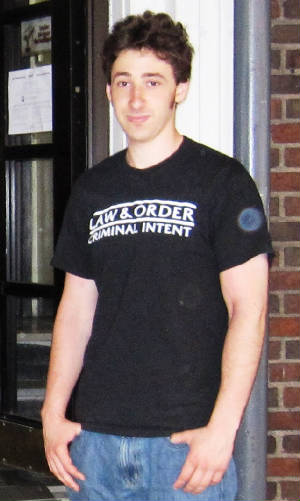 In June, Aidan, who is now 24, had recently gone on summer break from his regular job at the TV show Law &
Order: Criminal Intent, where he’s been a production assistant for over two years. Having heard one too many references
to the industrial-size jar of peanut butter on which he was now subsisting, I decided to bring him some groceries. I told
him I’d be stopping by with my Care package late that afternoon, prior to joining my college roommate, Hallie, for an
early dinner. When I spoke to him en route from Connecticut (on speakerphone, of course), he assured me that he’d be
home. When I arrived an hour or so later, though, he was nowhere to be found. In June, Aidan, who is now 24, had recently gone on summer break from his regular job at the TV show Law &
Order: Criminal Intent, where he’s been a production assistant for over two years. Having heard one too many references
to the industrial-size jar of peanut butter on which he was now subsisting, I decided to bring him some groceries. I told
him I’d be stopping by with my Care package late that afternoon, prior to joining my college roommate, Hallie, for an
early dinner. When I spoke to him en route from Connecticut (on speakerphone, of course), he assured me that he’d be
home. When I arrived an hour or so later, though, he was nowhere to be found.
In his defense,
I must confess that I realize he doesn’t welcome my handouts. He prides himself on having become financially independent
soon after graduating college. So he refuses to take a cent from us and seems to think that means he shouldn’t accept
an occasional kugel or a couple of bags from Waldbaum's, either. To which I say, just because he’s found steady employment
and become a man (yes, there was the bar mitzvah a decade ago, but that was just, you know, symbolic), that doesn’t
mean I ceased to be a mother. A Jewish mother. I worry about my children constantly and always want to help.
So
there I was on his block on June 29th, a torrid Tuesday night. I phoned and rang his bell when I arrived, at 5:20.
No answer. I proceeded to pace back and forth near his door, growing increasingly perplexed and frustrated. The city air was
sweltering, at a record 98 degrees. My offerings, which included fresh fruit and other perishables, wouldn’t last overnight
in the car. I phoned three more times over the next 50 minutes. Where the heck was he?
Finally,
I saw the superintendent come out, and I persuaded him to let me in and unlock my son’s door so I could deposit my packages
inside. Watching him try well over a dozen keys before finding the right one only heightened my exasperation. At 6:12, I texted
my son, alerting him to the bags sitting in his hallway. Then I drove around the corner and pulled onto the West Side Highway,
late for dinner, both my clothing and mood badly wilted. Within three blocks, I stopped at a red light. That’s when
I heard a police car’s siren behind me. And for some reason, I suddenly realized, the car it was signaling to pull over
was mine.
 “What did I do, officer?” I asked, genuinely mystified. Tall and Aryan-looking, this
humorless, blonde fellow began barking that he’d seen me holding my cell phone to my ear and talking. Only then did
it occur to me that the device had still been clutched in my hand, although as I’d turned the wheel sharply to pull
over, I’d unconsciously dropped it. “What did I do, officer?” I asked, genuinely mystified. Tall and Aryan-looking, this
humorless, blonde fellow began barking that he’d seen me holding my cell phone to my ear and talking. Only then did
it occur to me that the device had still been clutched in my hand, although as I’d turned the wheel sharply to pull
over, I’d unconsciously dropped it.
I assured him I hadn’t been using my phone. This
only provoked him to accuse me of lying, as well as trying to hide the phone from him, first by holding it behind the wheel
and then burying it in my lap. The more I protested my innocence, the more hostile and aggressive he grew. Within moments,
I was blubbering and spewing an insane diatribe about how I was just a mother from Connecticut who never did anything remotely
illegal. This prompted further accusations. “There you go, ma’am, lying again!”
He returned briefly to his vehicle to write me a ticket. That’s when it occurred to me that I could show him
on my phone that I hadn’t made or received any calls recently. But he flatly dismissed this offer. “Ma’am,
I’m not a phone expert,” he replied coldly.
Needless to say, I left the scene of the non-crime
with a ticket in hand, incredibly distraught that I’d been accused of doing something I hadn’t done – and
never do, no less ---and brimming with righteous indignation. It didn’t allay my distress to later learn that, thanks
to the ticket, my family’s insurance rates might go up.
My choice
was to either pay a $100 fine plus $50 mandatory surcharge or to protest the ticket, which would require me to appear in court
back in New York, five hours away round-trip, a few months later. What made the latter a plausible choice was that my older
brother happens to be a lawyer. A lawyer in New York.
It’s against my nature to ask anyone, even
a family member, for free advice or help. Besides, he lives and practices on Long Island, not in Manhattan, and specializes
in criminal matters. Not traffic court. But when I revealed my plight, he said that he knew it was even further against my
nature to plead guilty to something I hadn’t done. He insisted it was worth fighting the ticket and was fairly confident
that he could get me off.
As my older brother and only sibling, he also seems to worry about me, particularly ever since our parents died. Under
normal circumstances, he calls me almost daily. But he phones even more often when I’m having trouble – and this,
to him, was trouble with which he could help. Coming to the rescue, welcome or not, runs in the family, I guess.
My court date was set for early November, then delayed. Delayed twice, in fact. But finally, last Thursday, we had
our day in court.
Given the precariousness of winter travel, I chose to drive in the night before. The plan was that I’d meet my
brother at the courthouse the next afternoon, an hour before my case was scheduled, to go over the final plan. But we’d
already discussed our strategy in excruciating detail, and I’d managed to assemble copious evidence.
Per
his instructions, I’d printed out duplicate copies of my family’s itemized phone bill from June through July (a
72-page document), as well as the individual call records for June 29th for all four members of my family. I’d
also highlighted the calls made right before and after I’d been apprehended in bright yellow, proving that no one in
my family had dialed or received a call within 25 minutes of that time. Pretty persuasive, right?
Still, I
was absolutely terrified. I worried that I’d blurt out the wrong thing in court. I worried that I’d begin blabbering
to the judge, something I tend to do under duress. I was most fearful, though, that I would irritate my brother. He had coached
me to keep my account to a minimum, a few sentences at most. I was not to mention the groceries, kugel, my college roommate,
or anything extraneous. All decidedly against my nature. As you can see.
The
traffic violations court I’d been assigned to was on Rector Street, downtown near the Financial District. I had hoped
to buy my brother dinner afterwards, as a small measure of gratitude and compensation, but he had plans for that evening to
play paddle tennis, his chief passion, so the best I could do was offer lunch. I watched him savor his soup and meal at a
cavernous Chinese restaurant nearby specializing in dim sum. All I could manage to stomach was a cup of tea. I was a nervous
wreck.
He tried to reassure me, noting that most of his clients face extensive jail time if convicted; my penalty, at worst,
would be $150 plus court costs. As we walked over, though, he confessed to some last-minute misgivings of his own. My brother,
Joel Weiss, is one of the top criminal defense attorneys on Long Island. He takes high-profile cases and is quoted frequently
in major newspapers, including The New York Times. But traffic court isn’t his usual turf, and judges can be
inclined to favor police officers over plaintiffs. It had suddenly occurred to him how embarrassing it would be if he couldn’t
get me off on a minor charge -- one that I hadn’t even committed.
We were
on the docket for 4:30, but returned early to find the courtroom locked. While waiting, we marched discreetly past the room
in which the police officers gather. The court proceedings require that the cop who issued the ticket appear to testify before
the judge. I was terrified about facing this belligerent fellow again, although my brother assured me that he would not be
allowed to speak to me directly. But no one in the police quarters resembled him, according to my recollection.
Finally,
we were admitted to the overheated and rather dingy hearing room, which featured a low ceiling, four rows of wooden pew-like
benches to accommodate the accused, and harsh fluorescent lighting that cast a sickly pallor on everyone present. A long perpendicular
bench was reserved for the accusing officers, none of whom looked familiar. Soon the judge entered and took his place, seated
at a high desk facing the rest of the room. “Red Storm!” he announced, glancing down at the docket and presumably
calling the first plaintiff by name. No one responded. “Red Storm!” he cried again.
Judge Re, an affable
man with a scruffy gray beard, appeared to be in his 60s and to have an oddly dry sense of humor. He continued calling cases
up in succession, greeting various police officers and lawyers by name with an easy 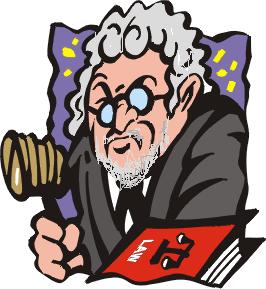 familiarity and rolling his eyes as though he’d been performing this tiresome duty for decades and could only stand
to do it another day by making light of the proceedings as much as possible. There seemed to be a running joke between him
and the assorted court personnel about Gray’s Papaya, a New York fast-food place. More than once, he summoned people
from out in the hall, demanding to know how much a hot dog cost there now. familiarity and rolling his eyes as though he’d been performing this tiresome duty for decades and could only stand
to do it another day by making light of the proceedings as much as possible. There seemed to be a running joke between him
and the assorted court personnel about Gray’s Papaya, a New York fast-food place. More than once, he summoned people
from out in the hall, demanding to know how much a hot dog cost there now.
And, of course, there was the
same refrain, echoing after every case concluded. “Red Storm! Red Storm! Red Storm!”
It encouraged
me to observe that all of the other plaintiffs appeared barely able to speak English and to be shabbily dressed in jeans or
other inappropriately casual clothes. My brother, by contrast, who is a strapping and prepossessing 6-foot-1,
sported a smart business suit and tasteful necktie, while I’d opted, per his instructions, for conservative garb, black
slacks and a subdued sweater (although when I slipped it on in the hotel that morning, I realized that it was a bit more form-fitting
than I'd recalled).
It also didn’t escape my notice that, as the
judge noted derisively, each of the other plaintiffs had a lengthy record of previous infractions. (One young man with a heavy
foreign accent boasted nine tickets, even though he only had a learner’s permit and had yet to acquire an actual driver’s
license.) Personally, I’ve never received a speeding ticket, nor any other moving violation in the past 25 years. What
I’d told the officer was true: I do nothing. Might the judge let me off, simply as a first offender?
Also reassuring was that one of the first cases called was automatically dismissed because the accusing officer had
failed to show up. Then again, a subsequent case was continued until April because the officer had been injured and was unable
to appear. Might I be required to endure this ordeal all over again, and could I in good conscience allow my brother to schlep
in from The Island again to accompany me once more?
Meanwhile, Red Storm remained elusive, So, apparently,
did my badge-bearing accuser. Every time someone in uniform entered, my brother would lean over. “Is that him?”
he'd whisper, even when the officer was a black woman. I smiled, but was beginning to doubt my own memory. After all, I hadn’t
laid eyes on this dreaded man in six months. Maybe he was sitting across the room, after all, and I simply didn’t recognize
him.
Finally, after 45 minutes, which felt more like an eternity, the judge interrupted his running repartee to address
me. He said that my officer had yet to show, and that he would be given until 5:30 to appear. When he learned that my lawyer
was my brother, he said that this wasn’t allowed. My brother argued that it actually was permissible, but only
in the state of Arkansas. They both found this remark uproarious. I’d misplaced my sense of humor somewhere on the downtown
IRT, but finally put down my stack of highlighted documents and almost began to relax.
Three more
cases were called as the clock ticked. Another round of hot dog jokes. More lawyers. More off-duty officers. But not mine.
At last, shortly after 5:30, the judge said that we were free to go, scrawling "Not Guilty" across my ticket.
“But… we were prepared to present concrete evidence!” my brother
protested, and once again they shared a hearty laugh.
A relief? I’d like to say so. But as we walked
through the hallway and exited into the frigid cityscape, we both realized that we’d been, well, robbed. After preparing
so meticulously, it was a true letdown for us both to have me vindicated purely by default.
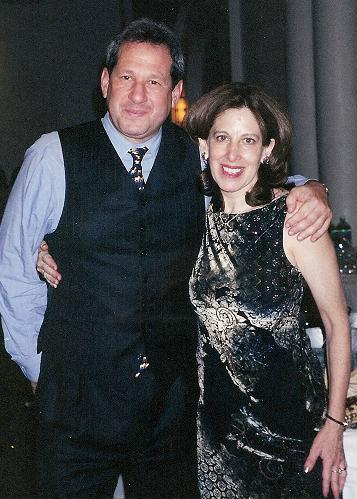 So it was no surprise when my brother phoned me at 4:30 the next afternoon. “Where are you?” he demanded,
explaining that he had decided we should continue showing up every day at the designated hour until we got the day in court
we deserved. Better yet, he wanted me to go back out on the West Side Highway in my car, searching for the same officer, but
this time with my cell phone actually held brazenly to my ear. To have gotten me off when I’d been innocent anyway would
have been too easy, he said. The real challenge would be to get me exonerated when I was blatantly guilty. I agreed. So it was no surprise when my brother phoned me at 4:30 the next afternoon. “Where are you?” he demanded,
explaining that he had decided we should continue showing up every day at the designated hour until we got the day in court
we deserved. Better yet, he wanted me to go back out on the West Side Highway in my car, searching for the same officer, but
this time with my cell phone actually held brazenly to my ear. To have gotten me off when I’d been innocent anyway would
have been too easy, he said. The real challenge would be to get me exonerated when I was blatantly guilty. I agreed.
I apologized once again for imposing on him to interrupt his work schedule on my behalf. He insisted that he’d
been more than happy to do it. “I’m your brother,” he said. “At the very least, I figured it would
give us a chance to hang out together. And it did.”
Indeed. It also allowed me to maintain my integrity.
For in the end, my brother was right. Having to plead guilty to a crime I hadn’t committed would have sucked something
out of my soul.
There was also something nice about having my big brother there ready to defend me, the way he once did when we were
kids and he wouldn’t let anyone else pick on me (even if he did his fair share of that himself).
But
I do feel like we have some unfinished business. When my mother died, he spoke in his eulogy of having visited her at the
special-needs school where she served as the longtime curriculum coordinator, and witnessing how everyone treated her with
enormous deference and admiration. How sad it was, I realized, that I'd never once seen her in her element, working as a respected
professional. Too often, that’s the case with family members and friends. We tend to view them only in social settings and never
in their place of work. And so it’s been with my brother. Although I’ve never doubted that
he’s an amazingly capable lawyer, I’ve never seen him in action. I need to remedy that. Too often, that’s the case with family members and friends. We tend to view them only in social settings and never
in their place of work. And so it’s been with my brother. Although I’ve never doubted that
he’s an amazingly capable lawyer, I’ve never seen him in action. I need to remedy that.
So look
for me cruising the West Side Highway. Better yet, call me while I’m on the road. Meanwhile, according to the Internet,
the special at Gray’s Papaya – two hot dogs and a papaya drink – will set you back $4.45. Have one on me,
Judge Re. Red Storm!
1:20 pm
Wednesday, January 5, 2011
A Word From the Weiss
When will I ever learn? Forgive me for paraphrasing a song made popular by Peter, Paul and Mary in the ‘60s,
dating myself as a decided oldie and also descending into something of a cliché, all in one fell swoop. But seriously,
I want to know. When will I?
When last week spoke – last year, although it was in fact only a week ago --
my husband and I were on the verge of jumping through hoops to accommodate our daughter’s non-negotiable determination
to spend New Year’s Eve with her boyfriend. She had pointed out plaintively that, at the tender age of 21, she’d
never had the imcomparable pleasure of kissing the man she loved at midnight on December 31st. (Although she dated
a very sweet boy through much of middle school and high school, his family or ours was always away on the occasion, requiring
them to celebrate together over the phone… which, contrary to common wisdom, is not the next best thing to
being there. That would be Skype.)
Having blown my own shot at this once-in-a-lifetime chance (not love,
which can presumably happen at any age, but rather the combined magic of being both 21, poised on the threshold of everything
important, and also on the threshold of a spanking new year), I sympathized profusely – enough to pack up the car and
drive four hours to snowbound Stowe, VT, where Stevo, the vaunted b.f., was performing with his rock band at a ski lodge.
I fully realized before and throughout this undertaking that all sorts of things could potentially go wrong. We could
go to all that extreme effort and she still might end up disappointed for one reason or another. The b.f. wouldn’t
be quite thrilled enough to see her. Or she wouldn’t be as thrilled as she had expected to see him. They could squabble
over who knows what? Love, in icy Vermont as much as anywhere, is the slipperiest of slopes. But when you care about someone
as much as I love my no-longer-little girl, it’s worth bending yourself into a pretzel just for a peanut-sized
chance at giving them one big gulp of happiness.
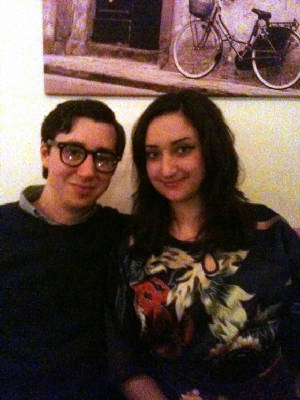 So I’m relieved to report that our sacred mission was essentially accomplished. Our daughter was a bit disappointed
to discover that the band was not staying at a posh resort, as she had anticipated, but rather being put up in someone’s
house. Even worse, she was assigned to the children’s room, replete with Disney-character bedding and a vast collection
of dolls. Also, I grew slightly ballistic when she mentioned that their plans for the Eve involved driving to Burlington,
a college town that I soon learned a) was nearly an hour away and b) had the dubious distinction, according to that evening’s
local news, of having the highest per capita level of binge drinkers in the nation. Had we really schlepped four hours to
keep her safe only to have her driving around in the snow with rock musicians, well after midnight on the drunken-est night
of the year? So I’m relieved to report that our sacred mission was essentially accomplished. Our daughter was a bit disappointed
to discover that the band was not staying at a posh resort, as she had anticipated, but rather being put up in someone’s
house. Even worse, she was assigned to the children’s room, replete with Disney-character bedding and a vast collection
of dolls. Also, I grew slightly ballistic when she mentioned that their plans for the Eve involved driving to Burlington,
a college town that I soon learned a) was nearly an hour away and b) had the dubious distinction, according to that evening’s
local news, of having the highest per capita level of binge drinkers in the nation. Had we really schlepped four hours to
keep her safe only to have her driving around in the snow with rock musicians, well after midnight on the drunken-est night
of the year?
But she ended up sticking much closer to home, after all, and texted me around 1 a.m. that she was fine and
“having a blast.” This was music to my motherly ears, even if I’d just drifted off to sleep and the cell
phone buzz signaling the message’s arrival awakened me from some much-needed sleep.
So what, pray tell, is my problem
now? Merely that we returned home the next day as scheduled, while the band proceeded on to their next ski circuit gig, and
two days later my daughter is miserable and moping around the house, pining for his company once again. What qualified as
above-and-beyond parental self-sacrifice in my book has already been relegated to ancient history in hers. The lesson? Happiness,
or “having a blast,” however heartfelt, is fleeting… when you are 15, or 21, or maybe even past 50.
Misery, for some reason, is much more memorable. Not that we had much, if any, of that on our own weekend adventure.
While our daughter was languishing in rock band grunge land/Disneyworld, we were resting in the lap of luxury, being
entertained lavishly in our friends Pat and Mike’s exquisite and palatial new weekend home. (Love, like my daughter’s,
of course, trumps all, but who doesn’t appreciate a little taste of luxury now and then?)
As I mentioned last week, my husband
and I were spending New Year’s Eve alone together because our friends had already accepted an invitation to a small
party. We’d made reservations at a restaurant in the area that was serving a special holiday meal. When we found ourselves
driving by it earlier that afternoon, we decided to stop in and case the joint, since we’d never been there before.
To our distress, we had discovered that the place was a good 20-minute drive from where we were staying, up a steep and winding
mountain road. (As I indicated, I am no fan of motoring around late on New Year’s; even if you don’t drink to
excess, chances are that others on the road have.)
Also, the place was not exactly, well, elegant. Given
the price tag of $50 apiece for a four-course meal with live music and a Champagne toast, I’d envisioned something reasonably
stylish. Instead, we entered a honky-tonk burger joint overrun with ski bums playing pool. When I asked the jean-clad host
where we’d be seated, he led us to a tiny, lacquer-topped cocktail table near the bar equipped with two stools. “You’re
kidding!” I exclaimed. I asked if we could cancel our reservation, which we’d secured with a credit card. He shook
his head.
We spent the next three hours with mounting mild dread, anticipating the worst. I was no longer worried that
we might bicker over dinner or run short of conversation (not that either of us is often at a loss for words, but after 26
years of marriage, it happens). I now feared that the live band and bevy of young revelers at the bar would drown out any
hope of our even hearing each other, whatever we came up with to say.
So it was no enormous disappointment when we
drove back at the appointed hour only to be told that they’d somehow lost our reservation and, unless we were willing
to sit at the bar, they couldn’t fit us in. This seemed so merciful a reprieve that I briefly imagined it was an act
of G-d (although clearly He has more pressing things to worry about than my dinner plans). We ended up eating a quiet meal
at a rather ordinary but perfectly nice pizza and pasta joint called Pie-casso, then sharing a bowl of Ben & Jerry’s
ice cream (a quintessential Vermont experience, not that we needed to travel four hours to do it). We were back in front of
the TV by 10:30, watching an annoyingly glib Ryan Seacrest and an alarmingly decrepit Dick Clark co-host the raucous annual
festivities in Times Square on our friends’ gi-normous flat-screen TV (indeed the next best thing to being there, or
maybe even better).
Throughout that time, my husband kept inquiring about my New Year’s resolutions, and I kept ignoring
him or pretending I hadn’t heard the question. Resolutions are healthy, of course – it’s good to aim
for self-improvement, rather than accepting the imperfect status quo -- but talking about them is demoralizing. After all,
most are related to personal shortcomings, the ones that are almost impossible to fix. Besides, most of my resolutions this
year are related to my husband (and, as he later confessed, his are largely about me). Stating them aloud would not only have
jinxed our efforts, but also been a sure way to offend each other and nip our desire to get along better in the bud.
The strange thing I have to report
is that through that entire day and night, not one drop of liquor, wine, or any other form of so-called spirits passed my
lips. I was the designated driver for the evening, so I desisted at dinner. And the people hosting us are not drinkers themselves,
so we never even had a toast afterwards. We entered the New Year cold sober. At least we weren’t cold. Vermont, like
much of the East Coast, was having something of a heat wave.
Yet a few days later, that, too, seems like
ancient history. We survived the holiday and have already begun to focus on other, more important things. Fussing over New
Year’s is reminiscent of people who obsess about wedding plans, going to endless expense and insane effort, although
the ceremony and reception last no longer than an afternoon or evening and then you wake up the next morning to the real deal:
marriage.
Indeed, the party’s over. What a relief. Now the real adventure resumes. How will we do in our unstated
resolve to do better? I’ll keep you posted. All I know is that soon, our daughter will be back with the b.f. at college,
and we will be alone together again. Able to hear each other just fine, to stay home, or travel, or do whatever we choose…
rather than chasing after one-night-only contentment as fleeting as bubbles in a glass
12:14 pm
|
|
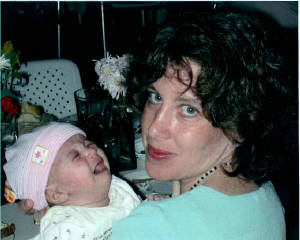
|
| That's me. The redhead on the right. But that is NOT my baby. |
No, sir, that's not
my baby. How could any mother smile beatifically while her own child wailed? Never mind that neither of my offspring
ever cried so plaintively, as far as I recall (not while I was there to nurture them through their every perceptible
need... although my son still complains that I often dressed him in garish and girlish color schemes, scarring him FOR LIFE). Besides, I'm distinctly beyond prime
delivery age ("Kitchen's closed!" as my mother might say), and my kids had departed the diaper stage by the
dawn of the Clinton Administration. Now in
their 20s, both are currently living on their
own, in not-too-distant cities, although each manages to phone me daily. In fact, to be exact, several times a
day, then sometimes text me, too. (That may sound excessive, and emotionally regressive, but I subscribe to
the Jewish mother's creed when it comes to conversing with kinder: Too much is never enough.)
Two demanding decades spent raising two kids who are kind, highly productive and multi-talented, who generally
wear clean underwear (as far as I can tell), and who by all visible signs don't detest me are my main credentials
for daring to dole out advice in the motherhood department.
Presenting myself as an authority on all matters Jewish may be trickier to justify. Yes, I was raised Jewish and am biologically an unadulterated, undisputable, purebred Yiddisheh
mama. I'm known for making a melt-in-your-mouth brisket, not to mention the world's airiest matzah
balls this side of Brooklyn. My longtime avocation is writing lyrics for Purim shpiels based on popular Broadway productions,
from "South Pers-cific" to "The Zion Queen." Then again, I'm no rabbi or Talmudic scholar. I
can't even sing "Hatikvah" or recite the Birkat Hamazon. Raised resoundingly Reform, I don't keep kosher, can
barely curse in Yiddish, and haven't set foot in Israel since I was a zaftig teen. Even so, as a longtime writer and ever-active
mother, I think I have something to say about being Jewish and a mom in these manic and maternally challenging
times. I hope something I say means something to you. Welcome to my nice Jewish world!
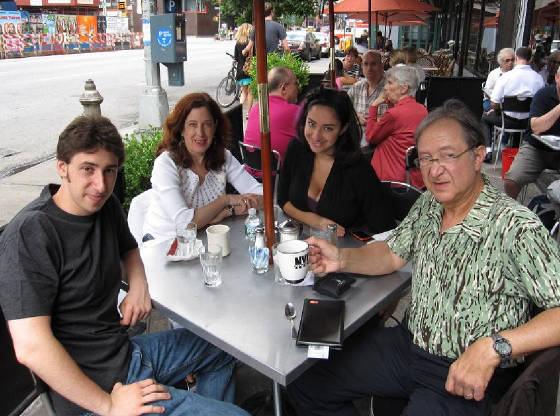
|
| LEVYS! MEET THE LEVYS! WE'RE A MODERN JEWISH FAMILY... |
In coming weeks, I will continue
posting more personal observations, rants, and even recipes (Jewish and otherwise). So keep reading, come back often,
and please tell all of your friends, Facebook buddies, and everyone else you know that NiceJewishMom.com is THE BOMB!
********************************************* The family that eats together (and maybe even Tweets together):
That's my son Aidan, me, my daughter Allegra, and Harlan, my husband for more than 26 years, all out for Sunday brunch on a nice summer weekend in New
York.

|